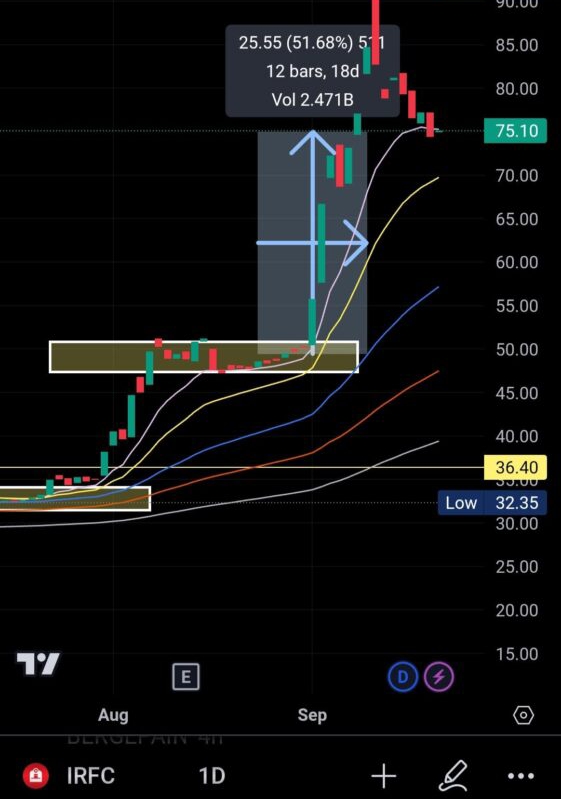What is Swing Trading?
Swing trading is a method used to capture “swings” in a stock’s price, holding it for a few days to weeks.
It can also be used as a strategy for intraday or positional trading. But when you say swing trading, most people mean swing strategy with short-term positional trading. This is the most commonly used term.
You can also do intraday with a swing strategy in smaller timeframes.
But as commonly used, I will be using the term ‘swing trading’ in the context of short-term positional trading on this website. And also because I practice the same strategy. Intraday is just not my cup of tea.
It differs mainly from day trading and long-term investing in the holding period. You don’t have to hold it too long, like investing, or make quick decisions, like intraday. Swing trading can be a safer way to get some regular income from the market.
Why do I love it?
- It is the safest style of trading, suitable for beginners—no quick trades, hasty decisions, etc. If you have enough knowledge and stick to your strategy, this can be your regular source of income.
- You get paid to do nothing in the market. If you can sit through the ups and downs of the market and manage your emotions, you can become a successful swing trader.
What I watch out for?
- Patience is the key. If you do not have patience and the required knowledge, this will be the most difficult style of trading for you. You will have to sit idle even if the market goes down and stick to your strategy.
- When the entire market is down, you will have to switch to swing trading in derivatives like options or futures. That’s because you can’t go short on equities.
- Overnight risks like news, updates, and announcements can trigger undesired movements in your stock.
- A little bit of knowledge about sector trends, overall market trends, global and local news, basic fundamental analysis of the stock, etc. helps in your conviction to hold on to the stock.
My Trade

In the example above, I bought IRFC shares on August 7, 2023, and sold the same on September 5, 2023. That’s 30 days. Holding the stock or derivatives for more than 2 days can be called swing trading, irrespective of profits and losses.

Check out my YouTube channel to watch how I do it!!
Why swing trading gave me better results ?
Now, if I had day traded each day, the chances of getting 50% are very low when compared to holding the stock.
This is mainly because I can’t predict the movement every day with great accuracy.
And my emotions would have disturbed my logic while trading.
I would have definitely missed the gap-ups.
As money management plays an important role in day trading, I would have exited a trade when I reached my desired target rather than making use of the full move.
… and so on..
These are just some of the reasons why I prefer swing trading.
I achieved 50% returns just by doing nothing and living my life to the fullest.
This proved me once again that smart work do pay good returns.
If I had day traded, I am sure I would have had maximum 10-20% returns. Or just losses. Plus the emotional roller coaster.
Conclusion
Swing trading is just a style of trading where you hold on to your trades longer than 2 days, catching a swing of the stock movement. You should choose your trading style based on your personality. Also, watch out for the drawbacks of your strategy.
FAQs
What are swings in swing trading?
What is the best strategy for swing trading?
Can swing trading make you rich?
What time frame is best for swing trading?
Can you swing trade options?
How long can I hold the trade?
Where can I learn swing trading?
How to select stocks for swing trading?
Is swing trading better than day trading?
Resources & Links
Tradingview – Charting Platform
Zerodha – Trading brokerage platform (India)
Disclaimer
Trading involves substantial risk, and past performance is not indicative of future results. Always conduct your own research and consider seeking professional advice before making any investment decisions. The information provided on this platform about digital entrepreneurship is based on the author’s experiences and industry knowledge. It should not be considered as financial, legal, or business advice. Please consult with experts in these fields before making business decisions. This blog may contain affiliate links, and we may earn a commission if you make a purchase through these links. Your support is appreciated.
